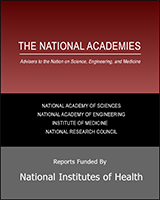
NCBI Bookshelf. A service of the National Library of Medicine, National Institutes of Health.
Institute of Medicine (US) Forum on Emerging Infections; Knobler SL, Mahmoud AAF, Pray LA, editors. Biological Threats and Terrorism: Assessing The Science and Response Capabilities: Workshop Summary. Washington (DC): National Academies Press (US); 2002.

as of December 21, 2001
a Draft for Discussion Prepared by:
The Center for Law and the Public's Health at Georgetown and Johns Hopkins Universities
For the Centers for Disease Control and Prevention [CDC]
National Governors Association [NGA],
National Conference of State Legislatures [NCSL],
Association of State and Territorial Health Officials [ASTHO], and
National Association of County and City Health Officials [NACCHO]
Lawrence O. Gostin, J.D., LL.D. (Hon.), Professor and Director,
Center for Law and the Public's Health, Georgetown University Law Center
600 New Jersey Avenue, N.W., Washington, D.C. 20001
In the wake of the tragic events of September 11, 2001, our nation realizes that the government's foremost responsibility is to protect the health, safety, and well being of its citizens. New and emerging dangers—including emergent and resurgent infectious diseases and incidents of civilian mass casualties—pose serious and immediate threats to the population. A renewed focus on the prevention, detection, management, and containment of public health emergencies is thus called for.
Emergency health threats, including those caused by bioterrorism and epidemics, require the exercise of essential government functions. Because each state is responsible for safeguarding the health, security, and well being of its people, state and local governments must be able to respond, rapidly and effectively, to public health emergencies. The Model State Emergency Health Powers Act (the “Act”) therefore grants specific emergency powers to state governors and public health authorities.
The Act requires the development of a comprehensive plan to provide a coordinated, appropriate response in the event of a public health emergency. It facilitates the early detection of a health emergency by authorizing the reporting and collection of data and records, and allows for immediate investigation by granting access to individuals' health information under specified circumstances. During a public health emergency, state and local officials are authorized to use and appropriate property as necessary for the care, treatment, and housing of patients, and to destroy contaminated facilities or materials. They are also empowered to provide care, testing and treatment, and vaccination to persons who are ill or who have been exposed to a contagious disease, and to separate affected individuals from the population at large to interrupt disease transmission.
At the same time, the Act recognizes that a state's ability to respond to a public health emergency must respect the dignity and rights of persons. The exercise of emergency health powers is designed to promote the common good. Emergency powers must be grounded in a thorough scientific understanding of public health threats and disease transmission. Guided by principles of justice, state and local governments have a duty to act with fairness and tolerance towards individuals and groups. The Act thus provides that, in the event of the exercise of emergency powers, the civil rights, liberties, and needs of infected or exposed persons will be protected to the fullest extent possible consistent with the primary goal of controlling serious health threats.
Public health laws and our courts have traditionally balanced the common good with individual civil liberties. As Justice Harlan wrote in the seminal United States Supreme Court case of Jacobson v. Massachusetts, “the whole people covenants with each citizen, and each citizen with the whole people, that all shall be governed by certain laws for the ‘common good.’” The Act strikes such a balance. It provides state and local officials with the ability to prevent, detect, manage, and contain emergency health threats without unduly interfering with civil rights and liberties. The Act seeks to ensures a strong, effective, and timely response to public health emergencies, while fostering respect for individuals from all groups and backgrounds.
Although modernizing public health law is an important part of protecting the population during public health emergencies, the public health system itself needs improvement. Preparing for a public health emergency requires a well-trained public health workforce, efficient data systems, and sufficient laboratory capacity.